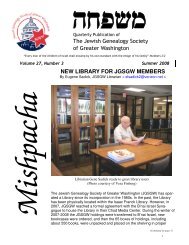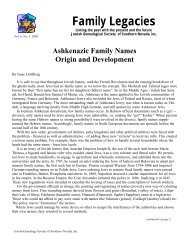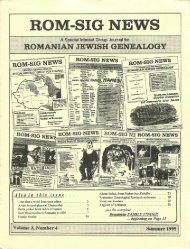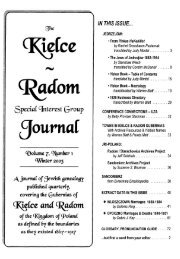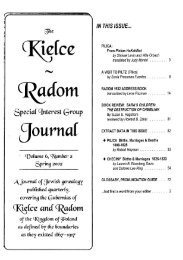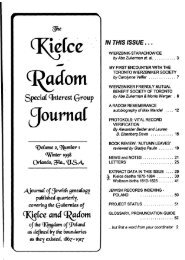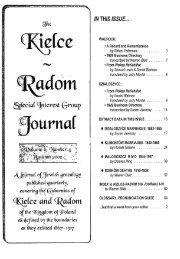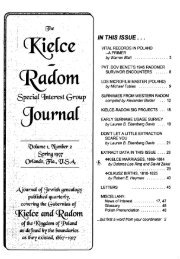THE MEMORIAL BOOK OF PÁPA JEWRY - JewishGen
THE MEMORIAL BOOK OF PÁPA JEWRY - JewishGen
THE MEMORIAL BOOK OF PÁPA JEWRY - JewishGen
Create successful ePaper yourself
Turn your PDF publications into a flip-book with our unique Google optimized e-Paper software.
The printing house of Ernő Stern on the Main Square is equipped with the most up-to-date<br />
machinery. Their products satisfy the highest requirements and the same can be said about the<br />
printing houses of Weisz and Drach.<br />
We have not finished with the stores in Kossuth Street. There's the elegant tailor's shop of<br />
Miksa Braun and at the corner of Eötvös Street there's the wild game store of Schlesinger where<br />
you can get pheasants, guinea fowl and hare. On the other side, the (carpentry workshop of Samu<br />
Böhm maintains its good name; few can compete with the products of this old reputable firm.<br />
The glassware store of Lipót Breuer is next to the head post office. Opposite there is a two-storey<br />
building on the corner, which houses the Parisien Department Store – since the owner is Jenő<br />
Steiner, it is kept closed on Shabbat. Turn at the corner and you will see the second-hand book<br />
store of Lajos Baum in Deák Ferenc Street. The personnel is made up of strictly observant girls<br />
whose knowledge of world literature can be envied by the educated as well.<br />
If you feel like having something nice to drink while enjoying your book, you can stop by<br />
at the bar of Antal Singer for a shot of brandy.<br />
When artisans belonged to guilds, Jews were not allowed to enter these professions.<br />
Emancipation opened up this opportunity for them, and in a short time the ridiculed Jews who<br />
used to wander around villages with their whistles, collecting rags, bottles or buying feathers,<br />
were transformed into hard-working, skilful artisans. In Pápa you could find tailors, shoemakers,<br />
woodturners, carpenters, tinmen, locksmiths, stocking-makers, furriers, hairdressers, wig makers,<br />
bakers, confectioners, glaziers, butchers and electricians who were Jewish. If you want clothes<br />
not made of shatnez, you should order them in the workshop of Adolf Schiffer in Bástya Street.<br />
The bearded, lean tailor works there together with his two sons until late at night. He stops his<br />
work only when the Chevra Kadisha calls him to conduct the ritual of tahara, for which he<br />
volunteers. He reads the Torah in the Tiferet Bachurim Association and on Shabbat also for the<br />
minyan at the Berger timber yard.<br />
If you need a tailored suit, you should go to Móric Stern in Rákóczi Street, the always<br />
cheerful tailor and adept storyteller, who wanted to raise the spirits of those on the death transport<br />
with funny tales, even in Kassa, the last railway station in Hungary, when they were about to set<br />
out on their way to face almost certain death.<br />
In addition to business and artisanship, the manufacturing industry also profited greatly<br />
from Jewish work and talent.<br />
Workshops and factories smaller than the large factories of Perutz and Leipnik were the<br />
following:<br />
the chemical plant of Dr. Pál Breuer<br />
the cement factory of József Kohn<br />
the brick factory of Ignác Wittmann in Kéttornyúlak<br />
the brick factory of Steiner in Tapolcafő<br />
the pipe factory of Boskowitz<br />
the calico factory of Blum<br />
the weaving mill of Jenő Balogh<br />
80



